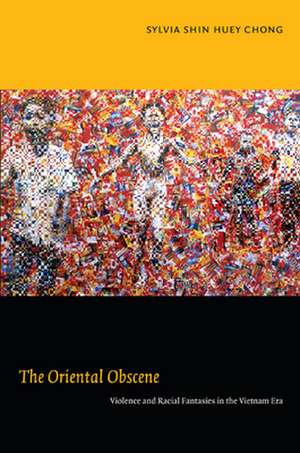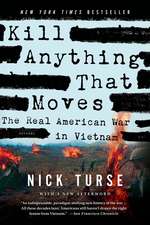The Oriental Obscene – Violence and Racial Fantasies in the Vietnam Era
Autor Sylvia Shin Hue Chongen Limba Engleză Paperback – 8 noi 2011
Preț: 305.08 lei
Nou
Puncte Express: 458
Preț estimativ în valută:
58.38€ • 60.61$ • 48.68£
58.38€ • 60.61$ • 48.68£
Carte tipărită la comandă
Livrare economică 24 martie-07 aprilie
Preluare comenzi: 021 569.72.76
Specificații
ISBN-13: 9780822348542
ISBN-10: 0822348543
Pagini: 384
Ilustrații: 84 illustrations
Dimensiuni: 156 x 235 x 15 mm
Greutate: 0.59 kg
Ediția:New.
Editura: MD – Duke University Press
ISBN-10: 0822348543
Pagini: 384
Ilustrații: 84 illustrations
Dimensiuni: 156 x 235 x 15 mm
Greutate: 0.59 kg
Ediția:New.
Editura: MD – Duke University Press
Recenzii
"Sylvia Shin Huey Chong has located the Vietnam War as the constitutive trauma of modern American nationhood, one that is particularly attached to a visuality of violence. She argues, moreover, that this trauma also serves as something of a primal scene around which whole sets of gendered and racialized positions are generated and then solidified in the public spheres of American politics and sociality. The Oriental Obscene offers a fascinating read for anyone interested in the Vietnam War, American racial politics, popular culture, and the making and endurance of American Orientalism. Anne Anlin Cheng, Princeton University
"The Oriental Obscene is fresh, original, scrupulously researched, and tightly argued. Sylvia Shin Huey Chong uses the psychoanalytic categories of trauma, the primal scene, and fantasy, relying centrally on the work of Jean Laplanche. She quite rightly contends that the theories of Laplanche and Deleuze can enrich each other, and she demonstrates how this works as she rethinks representations of the Vietnam War in visual media. Her book will attract a broad interdisciplinary audience, including scholars of film and media, cultural studies, Asian American studies, and critical race theory. Sharon Willis, author of High Contrast: Race and Gender in Contemporary Hollywood Film
"Taken in the context of scholarly investigations into representations of the Vietnam War, Chongs work is a thoughtful and important contribution to the canon. However, as an exploration of otherness and the construction of racial identities, The Oriental Obscene also provides a valuable resource to broader areas of research in film and media theory, cultural studies and other critical approaches to race." Josh Nelson, Screening the Past, July 2012
The Vietnam War was the first truly visual conflict for Americans, who watched it unfold nightly on their televisions and opened up their daily newspapers and weekly magazines to find graphic photos of violence and chaos happening some seven thousand miles away in Indochina.... Sylvia Shin Huey Chong joins the conversation about visual representations of the war, analyzing photographs and films produced during and after the conflict. She argues that depictions of the Vietnamese in American media constituted an oriental obscene which encapsulated a host of US anxieties about Asian immigrants, Far East politics, and challenges to race and gender conventions since the 1960s, in addition to reflecting American conceptions of the Vietnam War. - Journal of American Studies, February 2013
"Sylvia Shin Huey Chong has located the Vietnam War as the constitutive trauma of modern American nationhood, one that is particularly attached to a visuality of violence. She argues, moreover, that this trauma also serves as something of a primal scene around which whole sets of gendered and racialized positions are generated and then solidified in the public spheres of American politics and sociality. The Oriental Obscene offers a fascinating read for anyone interested in the Vietnam War, American racial politics, popular culture, and the making and endurance of American Orientalism." Anne Anlin Cheng, Princeton University "The Oriental Obscene is fresh, original, scrupulously researched, and tightly argued. Sylvia Shin Huey Chong uses the psychoanalytic categories of trauma, the primal scene, and fantasy, relying centrally on the work of Jean Laplanche. She quite rightly contends that the theories of Laplanche and Deleuze can enrich each other, and she demonstrates how this works as she rethinks representations of the Vietnam War in visual media. Her book will attract a broad interdisciplinary audience, including scholars of film and media, cultural studies, Asian American studies, and critical race theory." Sharon Willis, author of High Contrast: Race and Gender in Contemporary Hollywood Film "Taken in the context of scholarly investigations into representations of the Vietnam War, Chong's work is a thoughtful and important contribution to the canon. However, as an exploration of otherness and the construction of racial identities, The Oriental Obscene also provides a valuable resource to broader areas of research in film and media theory, cultural studies and other critical approaches to race." Josh Nelson, Screening the Past, July 2012 "The Vietnam War was the first truly visual conflict for Americans, who watched it unfold nightly on their televisions and opened up their daily newspapers and weekly magazines to find graphic photos of violence and chaos happening some seven thousand miles away in Indochina... Sylvia Shin Huey Chong joins the conversation about visual representations of the war, analyzing photographs and films produced during and after the conflict. She argues that depictions of the Vietnamese in American media constituted an "oriental obscene" which encapsulated a host of US anxieties about Asian immigrants, Far East politics, and challenges to race and gender conventions since the 1960s, in addition to reflecting American conceptions of the Vietnam War." - Journal of American Studies, February 2013
"The Oriental Obscene is fresh, original, scrupulously researched, and tightly argued. Sylvia Shin Huey Chong uses the psychoanalytic categories of trauma, the primal scene, and fantasy, relying centrally on the work of Jean Laplanche. She quite rightly contends that the theories of Laplanche and Deleuze can enrich each other, and she demonstrates how this works as she rethinks representations of the Vietnam War in visual media. Her book will attract a broad interdisciplinary audience, including scholars of film and media, cultural studies, Asian American studies, and critical race theory. Sharon Willis, author of High Contrast: Race and Gender in Contemporary Hollywood Film
"Taken in the context of scholarly investigations into representations of the Vietnam War, Chongs work is a thoughtful and important contribution to the canon. However, as an exploration of otherness and the construction of racial identities, The Oriental Obscene also provides a valuable resource to broader areas of research in film and media theory, cultural studies and other critical approaches to race." Josh Nelson, Screening the Past, July 2012
The Vietnam War was the first truly visual conflict for Americans, who watched it unfold nightly on their televisions and opened up their daily newspapers and weekly magazines to find graphic photos of violence and chaos happening some seven thousand miles away in Indochina.... Sylvia Shin Huey Chong joins the conversation about visual representations of the war, analyzing photographs and films produced during and after the conflict. She argues that depictions of the Vietnamese in American media constituted an oriental obscene which encapsulated a host of US anxieties about Asian immigrants, Far East politics, and challenges to race and gender conventions since the 1960s, in addition to reflecting American conceptions of the Vietnam War. - Journal of American Studies, February 2013
"Sylvia Shin Huey Chong has located the Vietnam War as the constitutive trauma of modern American nationhood, one that is particularly attached to a visuality of violence. She argues, moreover, that this trauma also serves as something of a primal scene around which whole sets of gendered and racialized positions are generated and then solidified in the public spheres of American politics and sociality. The Oriental Obscene offers a fascinating read for anyone interested in the Vietnam War, American racial politics, popular culture, and the making and endurance of American Orientalism." Anne Anlin Cheng, Princeton University "The Oriental Obscene is fresh, original, scrupulously researched, and tightly argued. Sylvia Shin Huey Chong uses the psychoanalytic categories of trauma, the primal scene, and fantasy, relying centrally on the work of Jean Laplanche. She quite rightly contends that the theories of Laplanche and Deleuze can enrich each other, and she demonstrates how this works as she rethinks representations of the Vietnam War in visual media. Her book will attract a broad interdisciplinary audience, including scholars of film and media, cultural studies, Asian American studies, and critical race theory." Sharon Willis, author of High Contrast: Race and Gender in Contemporary Hollywood Film "Taken in the context of scholarly investigations into representations of the Vietnam War, Chong's work is a thoughtful and important contribution to the canon. However, as an exploration of otherness and the construction of racial identities, The Oriental Obscene also provides a valuable resource to broader areas of research in film and media theory, cultural studies and other critical approaches to race." Josh Nelson, Screening the Past, July 2012 "The Vietnam War was the first truly visual conflict for Americans, who watched it unfold nightly on their televisions and opened up their daily newspapers and weekly magazines to find graphic photos of violence and chaos happening some seven thousand miles away in Indochina... Sylvia Shin Huey Chong joins the conversation about visual representations of the war, analyzing photographs and films produced during and after the conflict. She argues that depictions of the Vietnamese in American media constituted an "oriental obscene" which encapsulated a host of US anxieties about Asian immigrants, Far East politics, and challenges to race and gender conventions since the 1960s, in addition to reflecting American conceptions of the Vietnam War." - Journal of American Studies, February 2013
Notă biografică
Cuprins
List of Illustrations vii
Notes on Terminology, Proper Names, and Film Titles ix
Acknowledgments xi
Introduction. Specters of Vietnam 1
1. Bringing the War Home: Spectacles of Violence and Rebellion in the American 1968 33
2. Reporting the War: Ethical Crises of Action in the Movement-Image of Vietnam 75
3. Restaging the War: Fantasizing Defeat in Hollywood's Vietnam 127
4. Kung Fu Fighting: Pacifying and Mastering the Martial Body 173
5. Being Bruce Lee: Death and the Limits of the Movement-Image of Martial Arts 209
Conclusion. Returning to 'Nam: The Vietnam Veteran's Orientalized Body 249
Notes 283
Bibliography 325
Index 353
Notes on Terminology, Proper Names, and Film Titles ix
Acknowledgments xi
Introduction. Specters of Vietnam 1
1. Bringing the War Home: Spectacles of Violence and Rebellion in the American 1968 33
2. Reporting the War: Ethical Crises of Action in the Movement-Image of Vietnam 75
3. Restaging the War: Fantasizing Defeat in Hollywood's Vietnam 127
4. Kung Fu Fighting: Pacifying and Mastering the Martial Body 173
5. Being Bruce Lee: Death and the Limits of the Movement-Image of Martial Arts 209
Conclusion. Returning to 'Nam: The Vietnam Veteran's Orientalized Body 249
Notes 283
Bibliography 325
Index 353
Descriere
This book explores the impact of media representations of violence during the Vietnam War on people in the U.S.specifically how images of violence done to and by the Vietnamese were traumatic in ways that deeply affected the American psyche. Chong argues that films like "Apocalypse Now," "Deer Hunter," and "Rambo: First Blood Part II" were attempts to process that trauma and come to terms with the legacy of the war. She links the images to the political turmoil of the time, showing how they were used by pro- and anti-war groups, and by African Americans, whites, and Asian Americans, all for very different ends.















